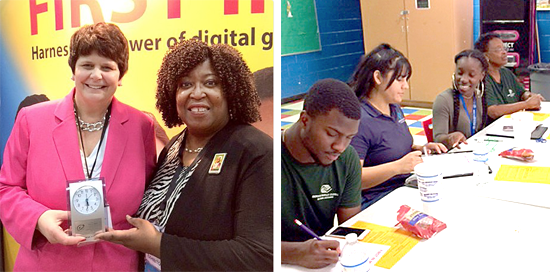SAN ANTONIO, TX—Between this year’s Texas NCSM and NCTM conferences, Benjamin Banneker Association President, Brea Ratliff, invited First In Math® representatives to conduct workshops for staff members and students at the Eastside San Antonio Boys and Girls Club.

Left: At NCTM 2017, Margaret Walker, (right) past president of Benjamin Banneker Association, presents a clock to Nancy Kane in recognition of the First In Math program’s long-time support of BBA initiatives. Right: Staff and students learn about the 24® Game at the San Antonio Boys and Girls Club.
Mel Christensen, Training Coordinator for the San Antonio area Boys and Girls Club Program, organized an outreach to the other surrounding clubs, whose members were also in attendance. First In Math’s Nancy Kane and Shelley Rosen directed one of the five the workshops.
In the morning, Rosen presented a slideshow highlighting several games from the 24® Game series. The staff was very interested in the 24 Game and in the activities provided. Each staff member was given a 24 Game to take with them.
The afternoon brought a fun-filled Power Hour, where Kane and Rosen worked with 6th and 7th graders, while Banneker members and volunteers worked with other grade levels. Students rotated through three different stations, including a 24® Game introduction and a fun 24 Game Factor Wheels activity that allowed them to work in small groups and compete against each other. At the third station, students enjoyed working on the First In Math online program website.
Some of the 40 staff members present, including Program Manager Mark Crump from the East Side Club, were former Boys & Girls Club members who are now there to mentor children and give back to the community.
Rosen hopes they will continue to use the 24 Game and the First In Math website to create opportunities for the children to connect with the math and the world of numbers. “First in Math and the 24 Game are, first and foremost, great learning activities—but they have many applications. Organizations like the Boys and Girls Clubs can use our proven type of game-based learning to engage children, and to help bridge the transition between school and home.”